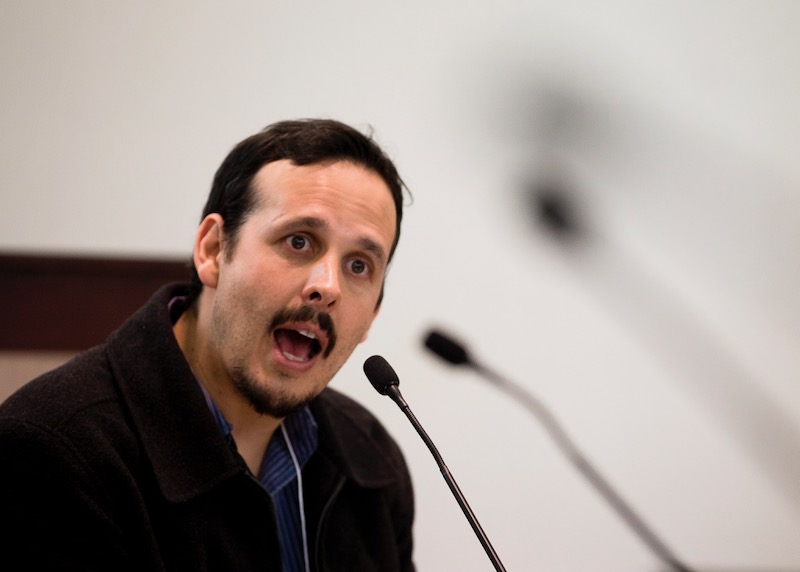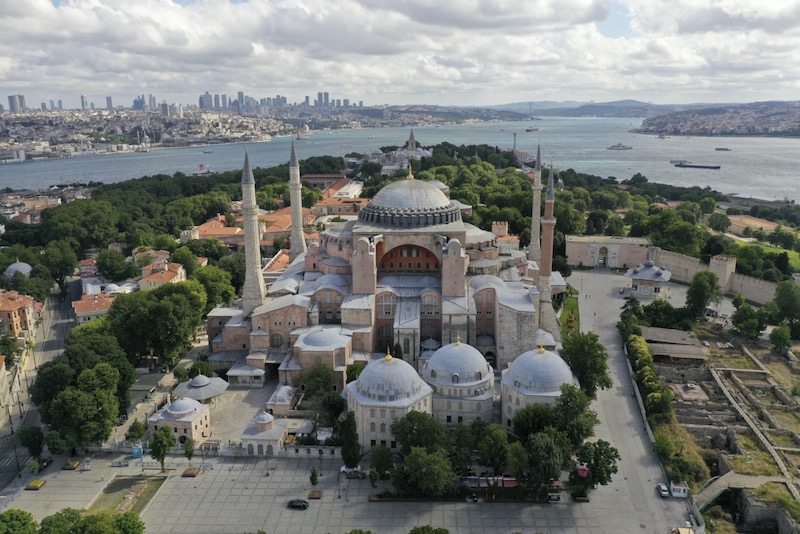Pope Francis has described himself as “very saddened” about Turkey’s planned reconversion of Istanbul’s Hagia Sophia museum into a mosque. Other church leaders have also criticised the decision.
“My thoughts go to Istanbul. I think of Hagia Sophia and I am very saddened,” Francis said after praying the Sunday Angelus in St Peter’s Square.
He made the off the cuff remarks while greeting seafarers on Sea Sunday today, saying that “the sea carries me a little farther away” and to Istanbul. Francis used the Italian word “addolorato” which can also be translated as “pained” or “distressed.”
It is the first time the Pope has commented about President Recep Tayyip Erdogan’s plan to turn Hagia Sophia – built 1,500 years ago as an Orthodox Christian Cathedral – back into a Mosque. The cathedral became a mosque after the Ottoman conquest in 1453, but has been a museum since 1934. Erdogan's decree directs the sixth-century landmark, a major expression of Christianity, to be opened to Muslim prayers from 24 July.
The Ecumenical Patriarch of Constantinople, Bartholomew I, and Metropolitan Hilarion Alfeyev of the Patriarchate of Moscow, have both voiced opposition to the move. Alfeyev said in a TV interview that Hagia Sophia held “the same value” for Orthodox Christians as St Peter's basilica in Rome held for Catholics.
Archbishop Chrysostomos Dimitriou of Cyprus said the failure of European governments to stand up to Turkey showed Orthodox Christians had “no allies, no brothers, no supporters”.
The World Council of Churches has also written to President Erdogan calling on him to a reverse a decision which they say would sow division.
In an earlier reaction Archbishop Ieronymos of Athens, head of Greece's Orthodox church, said: “Instrumentalising religion for party, geopolitical and geostrategic purposes reflects on those who attempt it. This is an insult and injury not only to Orthodoxy and Christianity as a whole, but to all civilised humanity and every thinking person, regardless of religion.”
The mosque conversion was also criticised by governments in the US, France and other countries, as well as by Greece's Culture Minister, Lina Mendoni, who branded it an “open provocation against the whole civilised world”, which would confirm “Turkey's cultural isolation” and “take the country back six centuries”.
Criticism also came from the European Commission, whose High Representative for Foreign Affairs, Joseph Borrell, told reporters the decree was “disappointing and regrettable”.
In a June statement, Turkey's Bishops' Conference said it favoured the landmark “retaining its character as a museum”, but also accepted the Erdogan government's right over its future as a matter of national sovereignty.
However, the Bishops’ Conference of Greece warned Erdogan in a letter last week the planned conversion would “violate the religious feelings of two billion Christians around the world”, as well as creating “an increasing alienation between monotheistic religions” when efforts were being made “to respect the beliefs of everyone, especially in democratic states”.
Although his remarks were brief, this is not the first time that the Pope has clashed with the Turkish president. In 2016, Francis used the word “genocide” while commemoration the mass killings of Armenians by Ottoman Turks during World War One, leading to Turkey recalling their ambassador to the Holy See.
Founded by Emperor Justinian I, Hagia Sophia was the world's largest church at its dedication in 537, but was used as a mosque for almost five centuries under Turkish rule, before being converted into a museum in 1935 by modern Turkey's secularising founder, Mustafa Kemal Ataturk.
Christian minorities have long complained of discrimination in Turkey, most of whose 84.3 million inhabitants are Sunni Muslims, and have faced problems recruiting clergy, establishing associations and obtaining building permits. During a 2014 visit, the Pope urged greater tolerance for the Catholic Church, which has seven dioceses and apostolic vicariates in the country, but has suffered several outrages, including the 2010 fatal stabbing of its Bishops’ Conference president, Bishop Luigi Padovese.
Meanwhile, the Vatican used “Sea Sunday” to appeal for the welfare of seafarers who have been hit by the Covid-19 pandemic.
Cardinal Peter Turkson said that “estimates suggest that, every month, 100,000 seafarers who finish their contracts and look forward to flying home were prevented from doing so by the outbreak of COVID-19 and the subsequent closure of borders and flights.” As a result, many are left stranded, far from home.
“You are not alone. you are not forgotten,” the cardinal, who is Prefect of the Dicastery for Promoting Integral Human Development, wrote. “This coming month of August the universal prayer intention that expresses the great concern for humanity and the mission of the Church of Pope Francis, is dedicated to The Maritime World. All the Catholic communities around the world will be invited to pray for all those who work and live from the sea, among them sailors, fishers and their families.”
In his post-Angelus prayer remarks on 12 July the Pope sent “an affectionate greeting to all those who work at sea, especially those who are far from their loved ones and their country.”



 Loading ...
Loading ...